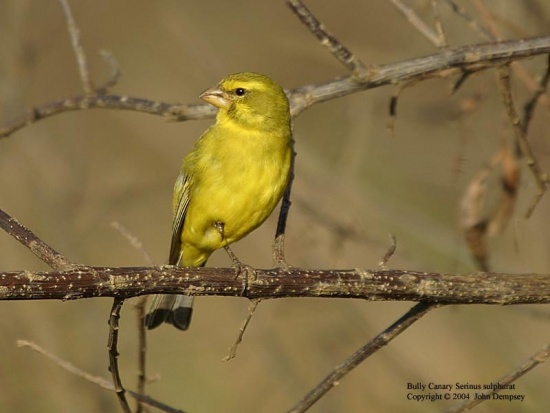(Photo caption. Taxonomy expanded) |
m (→Subspecies: changed Swaziland to eSwatini) |
||
| (7 intermediate revisions by 4 users not shown) | |||
| Line 1: | Line 1: | ||
| + | [[Image:Brimstone_Canary.jpg|thumb|550px|right|Male, subspecies ''wilsoni''<br />Photo © by {{user|jdbirdman|jdbirdman}} <br /> Cape vidal, [[KwaZulu-Natal]], [[South Africa]]]] | ||
'''Alternative name: Bully Canary''' | '''Alternative name: Bully Canary''' | ||
| − | ;[[:Category: | + | ;[[:Category:Crithagra|Crithagra]] sulphurata |
| − | + | ''Serinus sulphuratus'' | |
==Identification== | ==Identification== | ||
| − | + | [[Image:STH 5871.jpg|thumb|400px|right|Subspecies ''sharpii''<br />Photo © by {{user|volker+sthamer|volker sthamer}}<br />Kazinga, [[Uganda]], July 2018]] | |
| + | 13·5–16 cm (5¼-6¼ in)<br /> | ||
A large canary with a big bill.<br /> | A large canary with a big bill.<br /> | ||
| − | + | Male | |
| + | *Bright yellow underparts | ||
| + | *Olive-green [[Topography#Heads|malar]] stripe | ||
| + | *Bright yellow but short [[Topography#Heads|supercilliary]] stripe. | ||
| + | ====Similar species==== | ||
| + | [[Yellow Canary]] has a supercilium that is much longer and does not narrow so quickly behind the eye. | ||
==Distribution== | ==Distribution== | ||
| + | [[File:Brimstone_Canary_WL.jpg|thumb|350px|right|Photo © by {{user|Wiganlad| Wiganlad}}<br />[[South Africa]], 18 October 2014]] | ||
[[Africa]]: [[Uganda]] and [[Kenya]], south to eastern and southern [[South Africa]]. | [[Africa]]: [[Uganda]] and [[Kenya]], south to eastern and southern [[South Africa]]. | ||
==Taxonomy== | ==Taxonomy== | ||
| − | ====Subspecies<sup>[[#References|[1]]]</sup> | + | ====Subspecies==== |
| − | + | There are 3 subspecies<sup>[[#References|[1]]]</sup>: | |
| − | *'' | + | *''C. s. sharpii'': |
| − | :*[[Kenya]], [[Uganda]], eastern [[ | + | :*[[Kenya]], [[Uganda]], eastern [[Democratic Republic of the Congo]] to [[Angola]], [[Zambia]] and [[Mozambique]] |
| − | *'' | + | *''C. s. wilsoni'': |
| − | :* | + | :*Eastern [[South Africa]] (eastern Limpopo south to [[KwaZulu-Natal]] and Eastern Cape), [[eSwatini]], and southern [[Mozambique]] |
| − | *'' | + | *''C. s. sulphurata'': |
| − | :*South | + | :*Southern South Africa (southern Western Cape and western Eastern Cape) |
Two additional subspecies ''frommi'' and ''shelleyi'' are not generally recognised, and ''languens'' is usually considered invalid<sup>[[#References|[2]]]</sup>. | Two additional subspecies ''frommi'' and ''shelleyi'' are not generally recognised, and ''languens'' is usually considered invalid<sup>[[#References|[2]]]</sup>. | ||
| + | |||
==Habitat== | ==Habitat== | ||
| − | + | Lowland coastal woodland, thicket, coastal scrub and gardens. | |
==Behaviour== | ==Behaviour== | ||
| − | + | ====Diet==== | |
| + | Their diet consists mostly of seeds, leaves, flowers, berries, buds and ripened fruit. They also eat some insects such as termites. | ||
| + | |||
| + | They are usually seen either singly or in pairs. | ||
==References== | ==References== | ||
| − | #{{Ref- | + | #{{Ref-Clements6thAug18}}#Avibase |
| − | #Sinclair I & Ryan P. 2003. ''Birds of Africa south of the Sahara''. Princeton University Press. ISBN 0620207299 | + | #Sinclair I & Ryan P. 2003. ''Birds of Africa south of the Sahara''. Princeton University Press. ISBN 0620207299 |
| + | #Handbook of the Birds of the World Alive (retrieved December 2018) | ||
{{ref}} | {{ref}} | ||
==External Links== | ==External Links== | ||
| − | {{GSearch| | + | {{GSearch|Canary+sulphurat}} |
| − | [[Category:Birds]] [[Category: | + | [[Category:Birds]] [[Category:Crithagra]] |
Revision as of 10:04, 11 November 2021
Alternative name: Bully Canary
- Crithagra sulphurata
Serinus sulphuratus
Identification
13·5–16 cm (5¼-6¼ in)
A large canary with a big bill.
Male
- Bright yellow underparts
- Olive-green malar stripe
- Bright yellow but short supercilliary stripe.
Similar species
Yellow Canary has a supercilium that is much longer and does not narrow so quickly behind the eye.
Distribution
Africa: Uganda and Kenya, south to eastern and southern South Africa.
Taxonomy
Subspecies
There are 3 subspecies[1]:
- C. s. sharpii:
- Kenya, Uganda, eastern Democratic Republic of the Congo to Angola, Zambia and Mozambique
- C. s. wilsoni:
- Eastern South Africa (eastern Limpopo south to KwaZulu-Natal and Eastern Cape), eSwatini, and southern Mozambique
- C. s. sulphurata:
- Southern South Africa (southern Western Cape and western Eastern Cape)
Two additional subspecies frommi and shelleyi are not generally recognised, and languens is usually considered invalid[2].
Habitat
Lowland coastal woodland, thicket, coastal scrub and gardens.
Behaviour
Diet
Their diet consists mostly of seeds, leaves, flowers, berries, buds and ripened fruit. They also eat some insects such as termites.
They are usually seen either singly or in pairs.
References
- Clements, J. F., T. S. Schulenberg, M. J. Iliff, D. Roberson, T. A. Fredericks, B. L. Sullivan, and C. L. Wood. 2018. The eBird/Clements checklist of birds of the world: v2018. Downloaded from http://www.birds.cornell.edu/clementschecklist/download/
- Avibase
- Sinclair I & Ryan P. 2003. Birds of Africa south of the Sahara. Princeton University Press. ISBN 0620207299
- Handbook of the Birds of the World Alive (retrieved December 2018)
Recommended Citation
- BirdForum Opus contributors. (2024) Brimstone Canary. In: BirdForum, the forum for wild birds and birding. Retrieved 24 April 2024 from https://www.birdforum.net/opus/Brimstone_Canary






